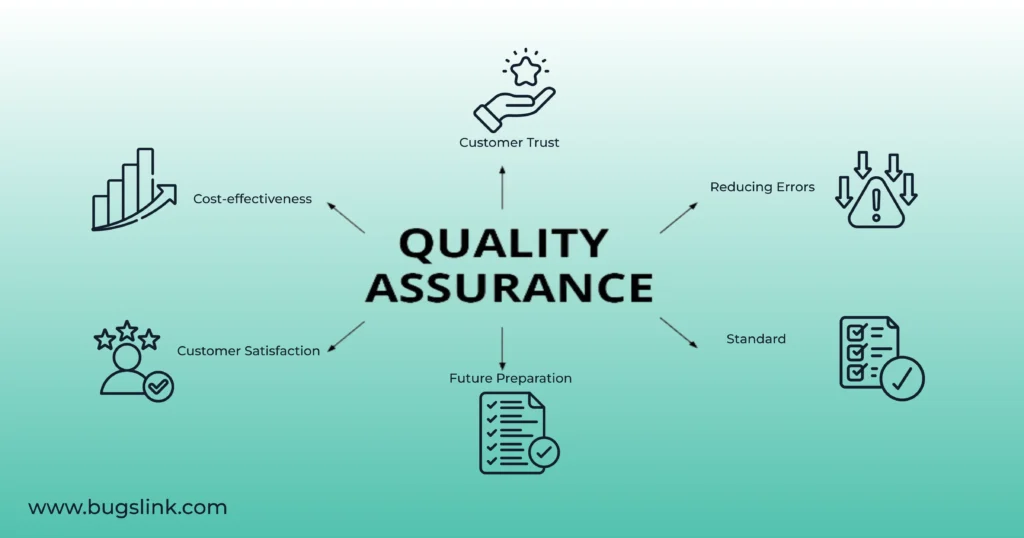Ensuring that products and services meet expectations is essential. Sustaining quality is crucial in this competitive world. Quality assurance, or QA, is a vital process businesses use to ensure that their products and services meet and exceed customers’ expectations. This blog post will explore quality assurance, its essentials, and what a quality assurance analyst does.
What is Quality Assurance?
Frequently shortened as QA, quality assurance is an organized procedure selecting whether a good or service meets the necessary quality requirements. Before a product or service is delivered to clients, it improves development processes and ensures they adhere to specified criteria.
Quality Assurance VS Quality Control
These terms serve different functions, although these terms are often used interchangeably.
- Quality Assurance focuses on improving processes and preventing defects.
- Quality Control involves inspecting the final product to identify defects and make corrections.
Importance of Quality Assurance

QA is essential in business as it guarantees that all products and services meet or exceed customer expectations. From planning to execution, we reduce the likelihood of errors and ensure consistency. Businesses can deliver subpar products, resulting in losses in sales, consumer satisfaction, and a tarnished reputation.
- Customer Trust: A brand that consistently provides high-quality products or services earns the trust of its customers. Quality assurance guarantees that your products satisfy agreed-upon criteria, enhancing consumer loyalty.
- Reducing Flaws and Errors: Decreasing errors and defects during the presentation or usefulness delivery process is one of the primary objectives of quality assurance. It contains issues that could negatively affect the customer experience and save time and money.
- Cost-effectiveness: Businesses can prevent costly errors by implementing quality assurance procedures. Dealing with customer complaints and returns later is significantly less efficient than identifying and resolving issues during production.
- Adhere to Industry Standards: Numerous industries must comply with particular quality standards. QA guarantees that your organization adheres to all pertinent regulations, averting potential legal complications and penalties.
- Future Preparation: In today’s economy, stagnation and regress are synonymous. A competitive advantage lies in monitoring consumer trends, forecasting future developments, and utilizing agent-customer interaction data. This dedication attracts investors and informs future strategies.
- Enhanced Customer Satisfaction: Customer satisfaction is crucial, as customers believe the company’s experience matters. A strong CX helps acquire loyal customers, and quality assurance (QA) helps identify service issues, leading to higher CSAT.
- Reduced Agent Churn: Quality assurance isn’t just about correcting issues; it’s also about rewarding those performing well. QA evaluations can bring these top performers to your attention, allowing you to recognize their achievements and making them feel valued and less likely to churn.
The Role of a Quality Assurance Analyst
Essentially, they are the guardians of product quality. They work across various industries to meet the highest standards, including software development, manufacturing, healthcare, and more. Their primary role is to analyze, review, and test products or services to ensure everything works as intended.
Duties of a Quality Assurance Analyst
The duties of a QA analyst are varied and call for a combination of analytical and technical abilities. They take accountability for:
- Testing and Inspections: Quality Assurance Analysts conduct various tests on a product, ranging from security assessments to functional testing. They aim to locate any flaws or problems affecting the product’s functionality.
- Recording Problems & Flaws: Every flaw discovered is logged and given priority. Before the product is delivered to the client, this documentation assists the development team in identifying and resolving issues.
- Working closely with development teams: To ensure that all groups know the same means for quality, QA analysts collaborate closely with developers, designers, and stakeholders.
Types of Testing Conducted by QA Analysts
Relying on the product and its planned purpose, QA Analysts do several forms of testing.
- Verifies that the product fulfills its intended purposes.
- Analyze the nature of the product in a range of scenarios.
- Makes sure the product is accessible and easy to use.
- Determines if the product is safe from hackers and secure.
Tools and Techniques for Effective QA
- Automated testing tools allow tests to run more quickly and efficiently, ensuring no area is ignored during the QA process.
- Manual testing is vital in evaluating aspects of a product that may require human judgment, such as user experience.
Challenges in Implementing Quality Assurance
- Resistance to Change: Employees used to established methods can sometimes resist introducing QA processes. Overcoming this resistance requires clear communication and training.
- Resource Constraints: QA can be resource intensive, requiring time, personnel, and equipment. However, the long-term benefits often far outweigh the initial costs.
Conclusion
Quality Assurance is crucial for any business aiming to provide consistent, superior products or services. It assists organizations in circumventing expensive mistakes, guarantees adherence to industry regulations, and improves consumer pleasure.
Integrating quality assurance into your processes enhances brand strength and fosters enduring client relationships.
Related: How to Provide Assurance in Customer Service
FAQs
The essential elements are planning, standards & norms, testing, evaluation, and ongoing feedback.
Of course! Quality assurance procedures can help small firms increase consumer trust, decrease errors, and provide higher-quality products.
Businesses provide workshops, certifications, and on-the-job activity to ensure staff members know about quality assurance procedures.

